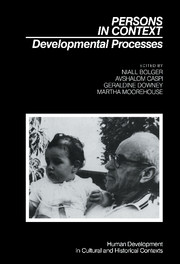Book contents
- Frontmatter
- Contents
- Preface
- Contributors
- 1 Development in context: research perspectives
- 2 Interacting systems in human development Research
- 3 Children, families, and communities: ways of viewing their relationships to each other
- 4 Human development and social change: an emerging perspective on the life course
- 5 Family process: loops, levels, and linkages
- 6 On the constructive role of problem behavior in adolescence
- 7 The sociogenesis of self concepts
- 8 Putting persons back into the context
- 9 How genotypes and environments combine: development and individual differences
- Author index
- Subject index
8 - Putting persons back into the context
Published online by Cambridge University Press: 04 May 2010
- Frontmatter
- Contents
- Preface
- Contributors
- 1 Development in context: research perspectives
- 2 Interacting systems in human development Research
- 3 Children, families, and communities: ways of viewing their relationships to each other
- 4 Human development and social change: an emerging perspective on the life course
- 5 Family process: loops, levels, and linkages
- 6 On the constructive role of problem behavior in adolescence
- 7 The sociogenesis of self concepts
- 8 Putting persons back into the context
- 9 How genotypes and environments combine: development and individual differences
- Author index
- Subject index
Summary
The assertion that behavior is a function of the person and the environment must surely now rate as our most popular homily – outranking even such favorites as “it will never heal if you pick at it.” But it is clear that the contributors to this volume have managed to raise this injunction above the level of cliche by attending seriously to the detailed specification of the environmental factors that have been neglected for so long. As a veteran of social psychology – the field that claims the copyright for “Behavior is a Function of…” – and as a newcomer to the field of human development, I am impressed.
As an aspiring personologist, however, I was struck by Urie Bronfenbrenner's observation (this volume) that it is “the differentiating characteristics of the individual that are most often left unspecified” in contemporary developmental psychology and that “prevailing research paradigms considerably underestimate the role of the person's own psychological characteristics in affecting the course of his or her future development.” Apparently interactional approaches to development – like contemporary “interactional” psychology in general – are purging persons in their pursuit of context.
I have decided to heal this lacuna by picking at it. In particular, I present here a commentary on research paradigms in personality that complements Bronfenbrenner's commentary on research paradigms in developmental psychology. I end by pontificating on the “correct” strategies for putting persons back into the context.
- Type
- Chapter
- Information
- Persons in ContextDevelopmental Processes, pp. 203 - 216Publisher: Cambridge University PressPrint publication year: 1989



